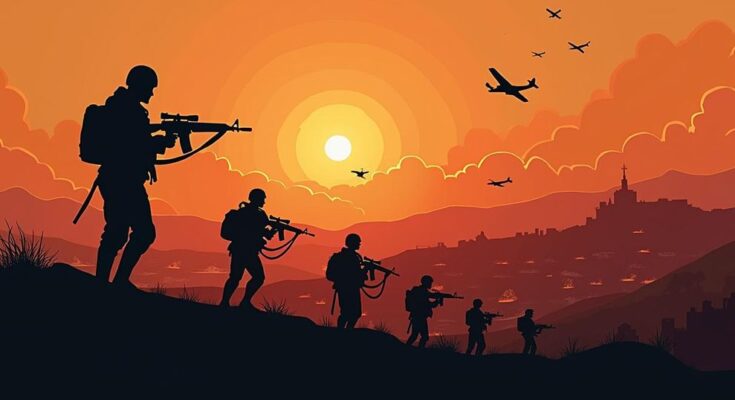Fierce clashes persist between Israeli forces and Hezbollah, with the IDF reporting significant Hezbollah casualties. A UN spokesperson critiques the IDF’s tactics, equating them with those used in Gaza, where a humanitarian crisis unfolds. The broader regional conflict, ignited by a Hamas attack, continues to escalate, with both sides suffering heavy losses.
Intense combat continues along the Israel-Lebanon border, with the Israel Defense Forces (IDF) confirming the elimination of at least 50 Hezbollah operatives during a series of military operations in southern Lebanon. This escalation marks a significant intensification of hostilities in the region. Mr. Jeremy Laurence, a spokesperson for the United Nations human rights office, has publicly criticized the actions of the IDF, claiming they employ similar tactics to those seen in the Gaza conflict. He lamented the catastrophic impacts in both areas, stating that “the devastation is beyond belief.” The ongoing Israel-Gaza conflict has now persisted for over a year, with regional tensions intensifying as a consequence. The hostilities, which erupted on October 7, began with an unprecedented cross-border attack by Hamas, resulting in approximately 1,200 Israeli fatalities and numerous civilian captives. Following this attack, Israel responded by declaring war and initiated a ground invasion, resulting in the largest mass displacement in the region since the establishment of Israel. In the context of the tensions with Hezbollah—an Iranian-backed militant group—Israel’s military responses have escalated dramatically over the past year. Israeli airstrikes have destroyed significant portions of southern Lebanon, leading to the deaths of over 1,400 individuals, including Hasan Nasrallah, the longstanding leader of Hezbollah. The historical context of violence along the Israel-Lebanon border underscores these recent developments, which are deeply rooted in the region’s tumultuous past. Conversely, the Gaza Strip has been subjected to one of the most devastating military campaigns of the current century, with Israel’s operations resulting in significant civilian casualties and widespread humanitarian crises. Reports indicate that tens of thousands have died and roughly half of the Gazan population now faces severe food shortages, described as famine-like conditions. In light of the tensions between Israeli Prime Minister Benjamin Netanyahu and numerous American political figures, including President Biden, it is noteworthy that the United States maintains unwavering support for Israel through military assistance, financial aid, and strategic vetoes during United Nations discussions regarding cease-fires. This sustained support highlights the complexity and long-standing nature of the Israeli-Palestinian conflict, which predates Israel’s formation. The urgency of the situation calls for an immediate and thoughtful approach to mitigate further humanitarian tragedies in both Gaza and Lebanon.
The ongoing conflict in the Middle East, particularly between Israel and Hezbollah as well as Hamas, is a continuation of longstanding tensions rooted in historical events dating back to the establishment of Israel in 1948. This complex landscape of territorial disputes, military actions, and political maneuverings has exacerbated humanitarian crises and deepened the schism between various factions involved. Notably, the violence has spread beyond Gaza into Lebanon, igniting fears of a broader conflict that could destabilize the region further. The recent escalation of violence, particularly between the IDF and Hezbollah, signals a critical turning point that threatens to heighten hostilities across multiple fronts.
The multifaceted conflict involving the IDF, Hezbollah, and Hamas underscores the fragile and volatile state of affairs in the Middle East. The substantial loss of life and humanitarian impact exacerbated by current hostilities reflects the dire need for a comprehensive resolution. International response, particularly from the United States, remains critical in influencing the course of the conflict, yet the deep-rooted historical grievances continue to impede the prospects for peace.
Original Source: www.washingtonpost.com




